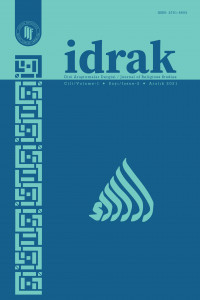The Moral Value system in The Qur’an: An analysis of Draz’s contribution
Draz, Ahlak, Degerler, Kur'an, Butuncul Yaklasim
The Moral Value System in the Qur’an: An analysis of Draz’s Contribution
Ethics, Values, Qur'an, Holistic Approach, Draz,
___
- Al-Bukhari, Mohammed Ibn Ismail. Sahih Al-Bukhari. Damascus, Syria: Dar Ibn Kathir, 2003.
- Al-khatib, Mu'taz. "Introduction to the Study of the History of Ethical Thought in Egypt in the Context of Reform and Renaissance Projects", Tabayyun. 2/26, Autumn 2018, 85-109. https://tabayyun.dohainstitute.org/en/issue0026/Pages/art04.aspx
- Al-Nasiri, Mohammed. “Usus Al-Nadhariyah Al-Akhlaqiyyah Wa Ma’ayiruha Min Mandhur Al-Qur’ān Al-Kareem,” Majallat Al-Ihya’. 33, 2010, 92-109.
- Al-Qaraḍāwī, Yūsuf. fī Wadāʻ al-Aʻlām. Beirut: Dār al-Fikr al-muʻāṣir, 2003.
- Al-Qushayri, Muslim Ibn Al-Hajjaj. Sahih Muslim. Riyadh, Saudi Arabia: Dar Taybah, 2006.
- Al-Sammān, Muḥammad ʻAbd Allāh. "Dustūr al-akhlāq fī al-Qurʼān" in Aḥmad Muṣṭafá Faḍīla, Muḥammad ʻAbd Allāh Draz Dirāsāt wa-buḥūth. Kuwait: Dār al-Qalam, 2007.
- Al-Sayyid, Ridwan. "The System of Values and Ethics in Islam," Al Tafahom, Issue 06 / 2011, 11-22. https://tafahom.mara.gov.om/en/al-tafahom/english issue/magazine/?issue=en&no=06#book_open_02/
- Al-Shinqīṭī, Muḥammad al-Mukhtār. Khayrat al-ʻuqūl al-Muslimah fī al-qarn al-ʻishrīn. Bayrūt : al-Shabakah al-ʻArabīyah lil-Abḥāth wa-al-Nashr, 2016.
- Al-Shinqīṭī, Muḥammad al-Mukhtār. faylasūf al-Qurʼān al-Karīm : Muḥammad ʻAbd Allāh Darāz ḥayātuhu wa-āthāruh. al-Qāhirah : Dār al-Mashriq, 2017.
- Badawī, Al-Sayyid Muḥammad. "al-Ilzām al-khuluqī ʻinda al-Duktūr Muḥammad ʻAbd Allāh Darāz", in Aḥmad Muṣṭafá Faḍīla, Muḥammad ʻAbd Allāh Draz Dirāsāt wa-buḥūth. Kuwait: Dār al-Qalam, 2007.
- De Tassy, Garcin. doctrines et devoirs de la religion Musulmane; Tires Textuellment do Coran. Paris: La Librairie Orientale, 1826.
- Draz, Mohammed Abdullah. Dustur Al-Akhlaq fi Al-Qur’ān. Cairo, Egypt: Mu’assat Al-Risalah, 1998.
- Draz, M.A. The Moral World of the Qur'ān, Translated by Danielle Robinson and Rebecca Masterton. London: I.B.Tauris & Co Ltd, 2008.
- Draz, Mohammed Abdullah. Madkhal Ila Al-Qur’ān Al-Kareem. Cairo, Egypt: Mu’assat Iqra’, 2014.
- Hililli, Abdurrahman. “Dustur Al-Akhlaq Fi Al-Qur’ān .. Bi Munasabt Murur Nisf Qarn ‘ala Rahil Draz” May 28, 2008, http://almultaka.org/site.php?id=596
- Hililli, Abdurrahman “al-Ta’sil Al-Qur’āni Li Al-M’arifah: Qadhiyat al-Akhlaq Namauthujan”, July 5, 2008, http://www.almultaka.org/site.php?id=612
- Ismail, Salah. Kayfa Nata’amal Ma’a Al-Qur’ān Wa Al-Sunnah. Herndon, USA: International Institute of Islamic Thought, 1987.
- La Beaume, Jules. Le Koran Analyse dApres la Traduction de M. Kasimirski. Paris: MAISONNEUVE LIBRAIRES— ÉDITEURS, 1878.
- Lefevre, M. Les lois morales, religieuses et civiles de Mahomet extraites du Koran. Paris: victor Legou Libraire, 1850.
- Malkāwī, Fatḥī. "Manhaj Muḥammad ʻAbd Allāh Darāz fī al-taʼṣīl al-Islāmī li-ʻIlm al-akhlāq", Islāmīyat al-Maʻrifa, 14 /53, Summer 2008, 5-18.
- Saint-Hilaire, Barthelemy. Mahomet et le Koran. Paris: Dıdıer et c's lıbuaır es-edıteırs, 1865.
- Yayın Aralığı: Yılda 2 Sayı
- Başlangıç: 2021
- Yayıncı: Giresun Üniversitesi
Elif Şafak’ın “Aşk” Romanı ile Sinan Yağmur’un “Aşkın Gözyaşları” Roman Serisinin Mukayesesi
Kırâat Farklılıkları Bağlamında Tek Kelime İdğâmı
Düzeltme: Elmalılı'nın Hak Dini Kur'an Dili Tefsirinde Takvâ Kavramı
Osman b. Fûdî’nin İhyâu’s-Sünne Adlı Eserine Eleştirel Bir Bakış
Adnan ARSLAN, Halil SAĞIR, Yücel YILDIZ
Tefsir Çalışmalarında Oryantalist Etki
The Moral Value system in The Qur’an: An analysis of Draz’s contribution
Modern Arap Edebiyatında Sembolün Rolü: Temim Bergusi Örneği
